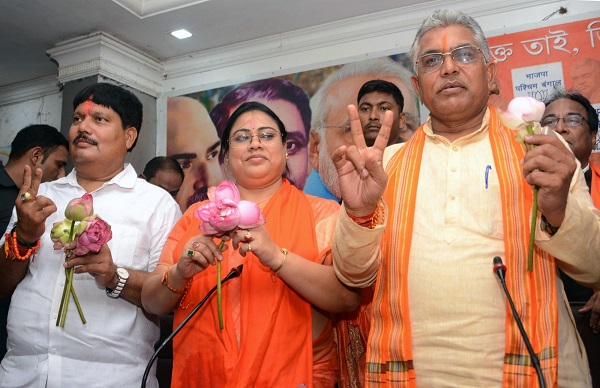
Kolkata, Amid a saffron surge in West Bengal, the ruling Trinamool Congress may have managed to keep itself afloat in the overall tally by winning 22 of the state’s 42 seats, but its calculations went haywire in the postal ballot section where it trailed behind its opponents in 40 constituencies.
On the strength of postal ballots, the BJP took a lead in 39 seats while Trinamool was only ahead in two seats – Kolkata South and Raiganj – only and the CPI-M led in Jadavpur.
What is alarming for Trinamool is the quantum of the saffron party’s lead from postal votes in some constituencies where the BJP candidates were far ahead of their Trinamool counterparts.
For instance, BJP’s John Barla who won from Alipurduar, got 3,016 postal votes, compared to 930 votes secured by Trinamool’s Dasarath Tirkey.
In Barrackpore, BJP’s Arjun Singh received 1,504 postal votes, as against a paltry 267 managed by Dinesh Trivedi of the Trinamool while BJP’s winning candidate in Darjeeling, Raju Bista got 5,410 postal votes, compared to 831 of Amar Singh Rai.
There were seats where the BJP took lead in postal votes but eventually lost.
For example, the saffron party nominee for Ghatal constituency, Bharati Ghosh got 1,463 postal votes against Trinamool’s winning candidate Deepak Adhikari’s (Dev) 552 votes.
According to political analysts, the resentment of state government employees over shortfall in dearness allowance and the Mamata Banerjee regime’s dilly-dallying approach on effective implementation of the Sixth Pay Commission recommendations could be “a factor” as their votes comprise a part of overall postal votes in each constituency.
In January, Chief Minister Banerjee had announced that state government employees would get dearness allowance at 125 per cent of their basic pay from the month.
Post this increase, the gap of dearness allowance between Central government employees with state employees was 23 per cent, state officials said.
The Banerjee government, in November last year, had extended the tenure of the state’s Sixth Pay Commission by another six months and since its formation, the commission’s tenure has been extended several times, state employees alleged.
The commission was set up in November 2015, to recommend a revised salary scale.








